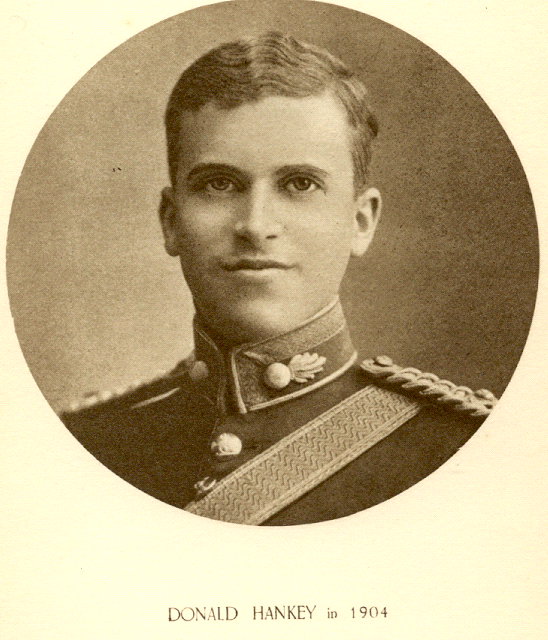Navigation: Alers Hankey > Miss Alers > William Alers > John Alers > Robert Alers >
1884-1916
Fourth son and youngest child of Robert Alers Hankey of Warcowie, South Australia and Brighton, Donald was born on 27 Oct 1884 at Brighton. He was educated at Rugby and passed into the RMA, Woolwich in 1901, before he was seventeen. In 1903 he was gazetted to the Royal Garrison Artillery, in which he served for five years, two of them in Mauritius. After a severe operation, he resigned and in 1907 went up to Corpus Christi College, Oxford, intending to take Holy Orders. He took his degree in 1910, with a second class in the Theological School, and during his time at Oxford worked at the Rugby Clubs in Notting Hill.

After six months holiday in British East Africa and Mauritius he joined the Leeds Clergy School, but soon decided that, in order to understand the needs of those with whom he would have to deal, he must first live with them and learn of them. Accordingly he took up his residence in Bermondsey and worked with the Oxford and Bermondsey Mission; his time there is commemorated by a Hankey Place and a Hankey Gardens, as well as a block of council flats called Hankey House. With the same object in view, and in order to see if it was really possible to emigrate boys from London slums, he took a steerage passage to Australia in 1913, and worked there for some months on the land.
When war broke out in 1914 he enlisted in the 7th Battalion, The Rifle Brigade, went to the Front in France in May 1915, and was wounded in July of the same year. In September he was given a Commission in the R.G.A., his old Regiment; but, in order that he might be the quicker in the fighting line, he applied for and obtained his transference to the Royal Warwickshire Regiment, in which his eldest brother had formerly served.
He returned to the Front in May 1916, fought in the Battle of the Somme, and fell in action between Morval and Le Transloy, near the main road from Bapaume to Peronne, on 12 Oct 1916.
Donald Hankey was best remembered as an author who drew his highest inspiration from the War, like Rupert Brooke. Except for two prize-winning essays at Woolwich, Donald’s first appearance in print seems to have been a series of articles on conditions for immigrants which he contributed from Australia to the Westminster Gazette in July and September 1913. His first book, The Lord of all Good Life, which he regarded as his life’s work, was published in October 1914 while he was a Sergeant in the Rifle Brigade. He contributed to the essays on Faith or Fear?, published in the early spring of 1916. But his most important compositions were a series of articles published in May 1916 under the title A Student in Arms. The first of these articles, Kitchener’s Army, appeared in the Westminster Gazette on 17 Dec 1914 while Donald was still training in England; the first to appear in The Spectator (9 Sep 1915) was A Passing in June 1915, subsequently reprinted as a small book; while one other article, The Cockney Soldier, also appeared in the Gazette in late 1915. Articles not collected also appeared in a religious weekly The Challenge, and led to the invitation to subscribe to Faith or Fear? These are philosophical essays from an independent point of view, dealing with the problems of war and showing a special sympathy for the common soldier. A second series of A Student in Arms was also published after his death; it was composed mainly of essays written in or near the trenches in France in 1916.